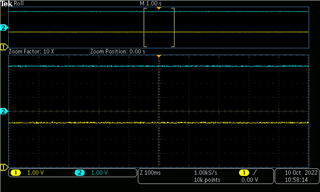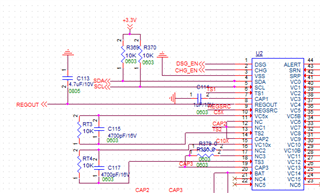Other Parts Discussed in Thread: BQ76920, BQ76930, MSP430F247
Hi,
I am designing BMS board firmware using mspf247 as main MCU, bq76940 as AFE to monitor battery. The communication interface between these two devices is I2C.
What troubled me is with each new pcba board while power on for the first time, the series cell voltages, pack voltage are read out correctly.
After running for a while, the readings are getting messed up. And susequently debugging shown the data reading is not right.
The basic programm logicals are to configuring bq76940 continuously monitor cell voltage, packvoltage periodically, and the alert signal will trigger an interrupt every 250ms,
set corresponding flag in the isr routines.
In a task the voltages and coulomb will be read.
Below i posed some code for reference,
void I2C_Initialise()
{
UCB0CTL1 |= UCSSEL_2+UCSWRST; // enable SW reset, use SMCLK as USCI clock source
//UCB0CTL1 |= UCSSEL_1+UCSWRST; // enable SW reset, use ACLK as USCI clock source
UCB0CTL0 = UCMST + UCMODE_3 + UCSYNC; // set to I2C master mode
UCB0BR0 = 10; // 92.16KHz @0.9216MHz of SCLK, make sure SCLK does not exceed 100KHz
UCB0BR1 = 0;
UCB0I2CIE = 0; // disable nack, stop condition detected, start condition detected, arbitration-lost interrupts
IE2 &= ~(UCB0TXIE + UCB0RXIE); // disable Tx&Rx interrupts
UCB0CTL1 &= ~UCSWRST; // release from reset state
bqI2CError = FALSE; // clear i2c fault error flag
bqI2CStatusReadError = NO_SIGNIFICANCE;
}
// 76940 initialzation
void BqInitialisebqMaximo(void)
{
uint16_t count = 0;
bqCoulomb = 0;
bqTotalCoulomb = 0;
bqBalanceIndex = 0;
RAM_CELL_BALANCE=bqBalanceIndex;
//BQ76920/BQ76930/BQ76940 need 250ms/400ms/800ms from SHIP-to_NORMAL transition to first read operation, datasheet, page 21.
//ALERT will be set in approx. 990ms after SHIP-to-NORMAL transition.
//Stay here for the alert to be set.
while(TRUE)
{
delay_1ms(1);
count++;
if(BqIsAlert() == TRUE)
{
break;
}
else
{
if(count >= 1200)
{
//MCU is powered but in 1s ALERT is not set ...error
break;
}
}
}
//dummy write command to BQ
BqSetRegisterByte(SYS_STAT, 0xff); //clear alert
//tt=BqGetRegisterByte(SYS_STAT);
//Set CC_CFG to recommended value of 0x19
//tt=BqGetRegisterByte(CC_CFG);
BqSetRegisterByte(CC_CFG, 0x19);
//tt=BqGetRegisterByte(CC_CFG);
//read adc gain and offset
bqAdcGain = BqGetAdcGain();
bqAdcOffset = BqGetRegisterByte(ADCOFFSET);
//set OV_TRIP and UV_TRIP according to threshold setting and gain+offset info
OVPThreshold = logic.regbyte_ov_trip;
BqSetRegisterByte(OV_TRIP, BqTripConversion(OVPThreshold, bqAdcGain, bqAdcOffset));
//tt=BqGetRegisterByte(OV_TRIP);
UVPThreshold = logic.regbyte_uv_trip;
BqSetRegisterByte(UV_TRIP, BqTripConversion(UVPThreshold, bqAdcGain, bqAdcOffset));
//tt=BqGetRegisterByte(UV_TRIP);
//setup protections
//SCD
regPROTECT1_t protect1;
protect1.Protect1Bit.SCD_DELAY = SCDDelay;
protect1.Protect1Bit.SCD_THRESH = SCDThresh;
protect1.Protect1Bit.RSNS=1;
BqSetRegisterByte(PROTECT1, protect1.Protect1Byte);
//tt=BqGetRegisterByte(PROTECT1);
//OCD
regPROTECT2_t protect2;
protect2.Protect2Bit.OCD_DELAY = OCDDelay;
protect2.Protect2Bit.OCD_THRESH = OCDThresh;
BqSetRegisterByte(PROTECT2, protect2.Protect2Byte);
//tt=BqGetRegisterByte(PROTECT2);
//OVDelay,UVDelay
regPROTECT3_t protect3;
protect3.Protect3Bit.OV_DELAY = OVDelay;
protect3.Protect3Bit.UV_DELAY = UVDelay;
BqSetRegisterByte(PROTECT3, protect3.Protect3Byte);
//tt=BqGetRegisterByte(PROTECT3);
//setup system controls
regSYS_CTRL1_t ctrl1;
ctrl1.SysCtrl1Bit.ADC_EN = logic.regbit_adc_en;
ctrl1.SysCtrl1Bit.LOAD_PRESENT = 0; //read-only bit
ctrl1.SysCtrl1Bit.SHUT_A = 0; //do not go to SHIP mode
ctrl1.SysCtrl1Bit.SHUT_B = 0; //do not go to SHIP mode
ctrl1.SysCtrl1Bit.TEMP_SEL = logic.regbit_temp_sel; //ExternalThermistor; //0 = die temp; 1 = thermistor temp
BqSetRegisterByte(SYS_CTRL1, ctrl1.SysCtrl1Byte);
//tt=BqGetRegisterByte(SYS_CTRL1);
regSYS_CTRL2_t ctrl2;
ctrl2.SysCtrl2Bit.CC_EN = logic.regbyte_sys_ctrl2.SysCtrl2Bit.CC_EN; //0 = disable continuous reading; 1 = enable
ctrl2.SysCtrl2Bit.CC_ONESHOT = 0; //0 = no action; 1 = trigger one shot reading
ctrl2.SysCtrl2Bit.DELAY_DIS = 0; //0 =normal delay; 1 = no delay (250ms)
ctrl2.SysCtrl2Bit.CHG_ON = 0; // 0 = CHG FET OFF; 1= CHG FET ON
ctrl2.SysCtrl2Bit.DSG_ON = 0; //0 = DSG FET OFF; 1 = DSG FET OFF
//ctrl2.SysCtrl2Bit.WAKE_EN = 0; //not present in BQ76930
//ctrl2.SysCtrl2Bit.WAKE_T =0; //Not present in BQ76930
BqSetRegisterByte(SYS_CTRL2, ctrl2.SysCtrl2Byte); // in initialization turn off chg and dsg
//tt=BqGetRegisterByte(SYS_CTRL2);
regSYS_STAT_t status;
status.StatusByte = BqGetRegisterByte(SYS_STAT);
if(status.StatusByte & STAT_FLAGS)
{
//device status flag(s) is set by some reason, clear it.
BqSetRegisterByte(SYS_STAT, STAT_FLAGS);
}
}
#pragma vector=PORT1_VECTOR
__interrupt void isr_port_1(void)
{
if (P1IFG & BIT5)
{
// read SYS_STAT byte
bqI2CError = NO_SIGNIFICANCE;
bqStatus.StatusByte = BqGetRegisterByte(SYS_STAT);
bqI2CStatusReadError = bqI2CError;
BqSetRegisterByte(SYS_STAT, STAT_CC_READY);
P1IFG &= ~BIT5; // clear interrupt flag
}
}
void taskA(void)
{
uint8_t i;
static uint16_t time_out_counter =0;
time_out_counter++;
if(bqI2CStatusReadError == FALSE || time_out_counter > 100)
{
if (bqStatus.StatusBit.DEVICE_XREADY == TRUE)
{
//for this fault data can not be trusted
fault.BQ.bit.XREADY = TRUE;
}
else
{
// 250ms cycle completed
if(bqStatus.StatusBit.CC_READY == TRUE)
{
// read Coulomb counter
int32_t cur;
int16_t tmp;
tmp = BqGetCoulombCounter();
if(bqI2CError == FALSE)
{
bqCoulomb = tmp;
bqTotalCoulomb += bqCoulomb;
//current is calculate here, in BQ current > 0 - chargeing
cur=(int16_t)((bqCoulomb*8.44)/(Rsense)); // 1uA unit
cur=(-cur/100000); // in unit of 0.01A
RAM_Shunt_I=cur;
}
else
{
//i2C error
fault.BQ.bit.i2c = TRUE;
}
// read cell voltage
uint16_t min=65535, max=0;
for(i=0; i<NUMBER_OF_CELLS;i++)
{
tmp = BqGetCellVoltage(i+1);
if (bqI2CError == FALSE)
{
RAM_Volt_Cell[i] = tmp;
if (RAM_Volt_Cell[i]<min)
{
min=RAM_Volt_Cell[i];
LowestCellIndex = i;
}
if (RAM_Volt_Cell[i]>max)
max=RAM_Volt_Cell[i];
}
else
{
//i2C error
fault.BQ.bit.i2c = TRUE;
}
}
RAM_HighestVolt=max;
RAM_LowestVolt=min;
if (RAM_HighestVolt > RAM_MaxVolt)
{
RAM_MaxVolt = RAM_HighestVolt;
}
if (RAM_LowestVolt < RAM_MinVolt)
{
RAM_MinVolt = RAM_LowestVolt;
}
if (!(Flag_Work&Flag_After1rstReadVolt))
{
Flag_Work|=Flag_After1rstReadVolt;
Soc_FirstDataAvailable((U16*)RAM_Volt_Cell);
}
// read pack voltage
tmp = BqGetPackVoltage();
if(bqI2CError == FALSE)
{
bqPackVoltage = tmp;
RAM_SUM_Cells = tmp;
}




